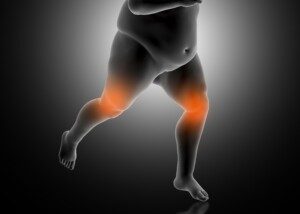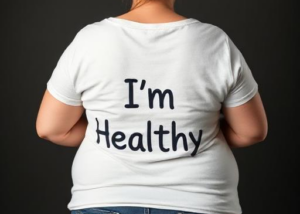Can it really be true that “fatphobia” is more harmful to fat people than the actual obesity itself?
The narrative that fatphobia actually causes more harm than obesity is gaining traction in some activist circles, namely TikTok.
Fatphobia is a term that originated within the body positivity movement, or rather, a subset of this movement.
There are a few takes on this term, along with its variation, “fatphobic,” a word often referring to any human who, to put it simply and generically, hates fat people.
The opposition to the fat acceptance movement explains that the term fatphobic was invented when fat acceptance influencers needed a quick bail-out when challenged about their beliefs.
Instead of continuing a discussion based on facts rather than feelings, these “fat liberation” activists will deem just about everyone and anything as fatphobic, such as fat liberation TikTok influencer Marissa Matthews, below.

Marissa Matthews
She believes that a person is fatphobic if their ad on a dating app says, “I like people who are active.”
By calling this fatphobic, she puts her foot in her mouth because her accusation implies that fat people can’t be active.
Taken literally, fatphobia means an irrational fear of fat – which could mean that of gaining excess weight oneself, and/or fear of fat people.
If I were told that tomorrow I’d awaken in a morbidly obese body, I’d be terrified.
This fear would NOT be irrational, because obesity kills on average of 300,000 Americans a year.
Furthermore, the extra weight would impair my mobility and energy – something very much to be afraid of.
When people take measures to avoid or reverse obesity, the fat acceptance community labels them as having “internalized fatphobia” — which doesn’t make sense, because, again, obesity is a widespread killer as well as disabler.
Ironically, fat liberationists such as Marissa Matthews and fellow TikTok obesity promotionist Mary Fran wouldn’t hesitate to wear a face mask and practice social distancing if COVID-19 deaths spiked.

Mary Fran
In fact, in 2023, COVID-19 was the 10th leading cause of death in the U.S., and in 2022 it was the fourth leading cause.
If we use the logic of these delusional influencers, we can label them covi-phobic.
Someone who keeps trying to quit smoking (the No. 1 cause of preventable death) would be a tobaccophobe, according to these influencers.
Fatphobia As a Killer
Fat activist influencers argue that the stress and mental health toll of fatphobia can outweigh the physical risks of obesity.
Some claim that this fatphobia is rampant in eating establishments and airplanes via small seating spaces.
Others focus more on clothing manufacturers who “don’t make my size” or retailers who don’t carry large-enough clothes.
Some put most of the blame on the medical profession, while others, such as Marissa Matthews, blame obesity-related comments from strangers, to her TikTok videos, on “harming my mental health.”
It’s true that some obese patients’ symptoms, including those from cancer, have been misdiagnosed as being caused by excess body fat.
It’s also aggravating to search for clothes on a rack and not be able to find one’s size, especially in a dynamic style.
It’s no secret that many very heavy people hear insulting comments from cars passing by.
But we need to put things into a clear context when it comes to what harms the physical (and mental) health of overweight individuals.
For example, it’s very difficult to believe that Mary Fran’s upset feelings over TikTok comments might kill her before her massive size will.
The assertion that fatphobia kills fat people more than fat does is an oversimplification.
Though we can ask ourselves if fatphobia can actually cause many of the conditions that obesity does such as type 2 diabetes, liver disease, kidney disease, coronary artery disease, congestive heart failure, blood clots, infertility, osteoarthritis in the knees, miscarriages and obstructive sleep apnea, let’s dive into this deeply and see just how mythical the narrative really is.
Mental Health Impacts of Stigma
Fatphobia, when taken symbolically, refers to prejudice, discrimination or negative attitudes towards obese individuals.
People who experience this fatphobia often face stigmatization in many spheres of life, including healthcare, employment and social relationships.
Yes, there is no question about that. Some extend this feeling of discrimination even to amusement park rides for which there’s a weight limit.
It’s no secret that a 280 pound woman’s weight will very likely prevent her from getting hired as a local, let alone national, news anchor.
The stigma has been linked to mental health issues including depression, anxiety and low self-esteem.
The chronic stress caused by feeling shamed or excluded can contribute to physiological changes that may worsen health outcomes over time.
For example, a study published in Obesity Reviews in 2017 found that weight-based discrimination was associated with increased psychological distress and a higher risk of developing depression and anxiety (Puhl & Suh, 2015).
Further, the stress response to discrimination can elevate cortisol levels, potentially leading to a range of physiological problems, including higher blood pressure, cardiovascular disease and metabolic dysfunction (Friedman et al., 2005).
Let’s not forget, though, that obesity itself is a major risk factor for these issues.
We also shouldn’t equate the “harm” that morbidly obese influencers feel from TikTok followers giving them health advice or even making nasty comments, to the reality of doctors missing cancer because they attributed its symptoms to obesity.
- You can’t find clothes off the rack?
- You can’t fit in a restaurant booth?
These issues, in addition to health risks, should be motivation to lose dangerous excess fat via sustainable eating habits and exercise including intense strength training.
And if you’ve had ongoing back and abdominal pain, your doctor absolutely and promptly should order tests to rule out serious causes instead of just telling you to lose some weight.
Cite the Sources
Influencers who claim that fatphobia harms, let alone kills, more fat people than does the fat itself never cite any studies to support this claim.
And that’s because the claim lacks a strong foundation in medical research.
The Health Risks of Obesity

Obesity has long been associated with an increased risk of heart disease, type 2 diabetes, stroke and certain cancers.
These risks are well-documented in medical literature, standing the test of time, with numerous studies establishing the direct connection between obesity and premature death.
The Global Burden of Disease Study, for example, found that obesity was a leading cause of death worldwide, responsible for an estimated 4.7 million deaths in 2017 alone (Global Burden of Disease Study, 2017).
Obesity increases the likelihood of developing conditions such as type 2 diabetes, which itself can cause a cascade of further health complications, including kidney disease, blindness and amputations.
A 2016 study in The Lancet estimated that obesity contributes to 2.8 million deaths each year worldwide (Ng et al., 2014).
Additionally, obesity is linked to an increased risk of cardiovascular disease, with research indicating that individuals with obesity are more likely to experience hypertension, high cholesterol and heart attacks (Reynolds et al., 2017).
The fact that thin people can drop from a heart attack or stroke is NOT relevant because these conditions have multiple causes – and obesity is one of them!
Other causes or influencing factors include smoking, a diet high in processed food, lack of exercise, illicit drug use and family history.
Nevertheless, the sheer mountainous volume of evidence linking obesity to poor health outcomes cannot be ignored simply because a morbidly obese influencer allowed a critic’s TikTok video to make her cry.
The “Stress Hypothesis”
It’s important to consider the cumulative effect of societal stigma, stress and discrimination on fat individuals.
Chronic stress can lead to a variety of physical and mental health issues, including those that directly affect cardiovascular health, metabolic function and immune system functioning.
These negative outcomes can equally occur in slender people who suffer from chronic stress or anxiety.
However, who’s much worse off? A slender person who suffers from chronic stress? Or … a morbidly obese person who suffers from chronic stress?
To put this in a more easily understood way, imagine a woman of average height who weighs 300 pounds and experiences chronic anxiety unrelated to fatphobia (e.g., cheating husband, drug addicted sister, unpleasant work environment, rude neighbors).
Certainly, the School of Common Sense & Logic would dictate that this woman’s physical health would NOT be as adversely affected from the stress if she weighed 150 pounds!
The “stress hypothesis” suggests that the psychological strain caused by fatphobia could exacerbate the health risks associated with obesity by triggering harmful stress responses that impact the body’s physiological processes (Hatzenbuehler et al., 2013).
A study published in American Journal of Public Health in 2015 examined the relationship between weight discrimination and health outcomes, finding that individuals who experienced discrimination due to their weight were at higher risk for chronic conditions like hypertension, diabetes and poor mental health (Sutin et al., 2015).
Another study published in Obesity in 2016 confirmed that weight-based discrimination was linked to negative health outcomes, including poorer self-reported health, increased depression and higher levels of cortisol (Jackson et al., 2016).
However, these studies do not suggest that fatphobia alone outweighs the physical risks associated with obesity.
Fatphobia compounds existing health challenges, but it does not substitute for the biological risks of obesity itself.
Plus, we must consider how a very large person may choose to spend a lot of time on social media, exposing themselves to “fatphobic comments” that they blame for their poor mental health – when instead, they can stay away from online places where these comments usually occur.
They can also stop posting videos that invite “harmful” comments.
Certainly, a video of a 260 pound woman tending to her vegetable garden, wearing suitable attire for this activity, isn’t going to elicit the slew of negative responses that a video of this same woman would of her grabbing her bare belly and shaking it and giving viewers the finger.
Can fatphobia “kill” more than fat?

The assertion that fatphobia kills fat people more than obesity itself lacks robust scientific evidence.
While the mental health consequences of fatphobia can lead to detrimental physical outcomes, they don’t outweigh the direct health risks associated with obesity.
The available data shows that obesity itself is a major risk factor for mortality, contributing to millions of deaths each year, whereas fatphobia, while harmful, has not been conclusively linked to higher mortality rates in the same way.
Nor does it cause obstructive sleep apnea, longer recovery times from major surgery or organ disease.
Moreover, a 2019 study published in JAMA examined the relationship between weight bias, obesity and mortality and concluded that there is no evidence to suggest that weight stigma is more lethal than obesity (Harris et al., 2019).
The study found that while weight stigma has negative mental and physical health consequences, it does not appear to directly increase mortality risk to the extent that obesity itself does. Nowhere near it.
 Lorra Garrick is a former personal trainer certified through the American Council on Exercise. At Bally Total Fitness she trained women and men of all ages for fat loss, muscle building, fitness and improved health.
Lorra Garrick is a former personal trainer certified through the American Council on Exercise. At Bally Total Fitness she trained women and men of all ages for fat loss, muscle building, fitness and improved health.
.










































